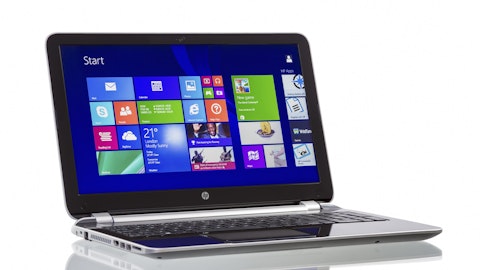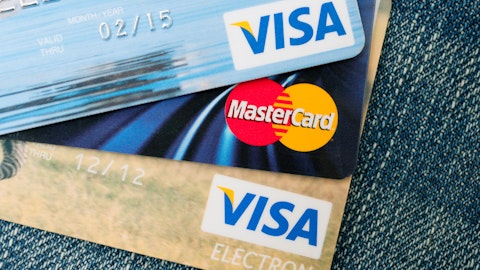3: Verizon Communications Inc. (NYSE:VZ)
Percent of Warren Buffett’s Portfolio: 1.3%
Dividend Yield: 4.4% Forward P/E Ratio: 12.9x (as of 4/15/16)
Sector: Telecom Industry: Diversified Communications Services
Dividend Growth Streak: 11 years
Verizon Communications Inc. (NYSE:VZ) is the largest wireless service provider in the United States and reaches over 98% of the country’s population with its 4G LTE network.
Wireless operations account for over 95% of Verizon’s operating profits and consist primarily of voice and data services and equipment sales.
At the end of 2015, Verizon Wireless had 112.1 million retail connections and generated sales of $91.7 billion.
Warren Buffett bought his initial stake in Verizon during the first quarter of 2014. Like many of the other companies owned by Berkshire Hathaway, Verizon enjoys strong brand recognition and operates in an industry characterized by high barriers to entry, inelastic product demand, and a relatively slow pace of change.
Building and maintaining a high quality communications network costs billions of dollars each year, and Verizon is one of the few companies with a large enough base of subscribers to be able to afford this cost each year.
Verizon Communications Inc. (NYSE:VZ) also owns the largest wireless network in the country, which allows it to reach more customers than its rivals and provide better service.
While industry pricing plans and contracts are constantly evolving, the essential nature of telecom services has remained steady. Customers need to communicate regardless of how the economy is doing, resulting in steady demand and predictable cash flows.
Follow Verizon Communications Inc (NYSE:VZ)
Follow Verizon Communications Inc (NYSE:VZ)
Receive real-time insider trading and news alerts
4: International Business Machines Corp. (NYSE:IBM)
Percent of Warren Buffett’s Portfolio: 8.5%
Dividend Yield: 3.4% Forward P/E Ratio: 11.2x (as of 4/15/16)
Sector: Technology Industry: Integrated Computer Systems
Dividend Growth Streak: 20 years
International Business Machines Corp. (NYSE:IBM) has been in business for more than 100 years and provides a wide variety of products and services, including IT infrastructure services, consulting, software, and server & storage hardware.
The company’s bread and butter over the years has been its mainframe computers, which are large, powerful computers that run major jobs such as managing the databases of credit card transaction of a bank.
Hardware only accounts for 10% of IBM’s sales, but many of IBM’s other revenue lines are supported by the installation and maintenance of mainframe computers.
Berkshire Hathaway began accumulating its stake in IBM during the second half of 2011, and the position has grown to be one of Buffett’s largest holdings at 8.5% of Berkshire Hathaway’s portfolio.
Warren Buffett has been familiar with IBM for a very long time. Buffett says he has read every annual report from IBM dating back to the early 1960s.
While Buffett has historically avoided technology companies due to their faster pace of change, IBM caught his eye for several reasons, beginning with the company’s strong reputation and customer relationships. Here is what Buffett had to say about his investment in IBM:
“The IT departments, you know, we’ve got dozens and dozens of IT departments at Berkshire. I don’t know how they run. I mean, but we went around and asked them and you find out that there’s – they very much get working hand in glove with suppliers. And that doesn’t mean things won’t change but it does mean that there’s a lot of continuity to it… Now, I would imagine if you’re in some country around the world and you’re developing your IT department, you’re probably going to feel more comfortable with IBM than with many companies.”
IBM’s reputation and long-standing operations have helped it amass an extremely impressive list of customers. Over 90 of the top 100 banks and all top 25 retailers in the U.S. run on IBM’s systems, and about half of all Fortune 100 companies outsource their IT operations to IBM.
It’s hard to imagine new entrants successfully taking away IBM’s business, especially considering the mission-critical nature of IBM’s products and services. It’s simply not worth the risk of switching to a less-proven vendor.
Warren Buffett was certainly aware of the changing technology landscape when he bought his initial stake in International Business Machines Corp. (NYSE:IBM), but he was likely comforted by the company’s long track record of successful evolution, steady free cash flow generation, strong brand recognition, and entrenchment with major customers.
Read More: 3 Reasons Buffett Blew It on IBM
Follow International Business Machines Corp (NYSE:IBM)
Follow International Business Machines Corp (NYSE:IBM)
Receive real-time insider trading and news alerts
5: Procter & Gamble Co (NYSE:PG)
Percent of Warren Buffett’s Portfolio: 3.2%
Dividend Yield: 3.3% Forward P/E Ratio: 22.7x (as of 4/15/16)
Sector: Consumer Staples Industry: Soap & Cleaning Preparations
Dividend Growth Streak: 59 years
Procter & Gamble Co (NYSE:PG) is one of the largest consumer packaged goods companies in the world with a large number of well-known brands across categories such as laundry detergent, health & beauty, and shaving.
Some of P&G’s major brands include Tide, Pampers, Charmin, Vicks, and Febreze.
Procter & Gamble is the definition of a blue-chip dividend stock. Warren Buffett’s position in the company resulted from his investment in Gillette back in 1989.
Procter & Gamble acquired Gillette in 2005, which converted Buffett’s Gillette ownership into P&G shares.
Buffett had gradually been reducing his stake in P&G over the last decade and announced an agreement in late 2014 to buy Duracell from P&G in exchange for his shares of P&G.
With the deal closing in 2016, Buffett’s P&G stake will be no more. However, Berkshire Hathaway likely wanted to own Duracell because of its strong brand recognition and market share (25%). It’s also worth noting that Duracell was part of Procter & Gamble Co (NYSE:PG)’s acquisition of Gillette, so Buffett had plenty of familiarity with the company already.
As technology continues to permeate every part of society, Buffett likely believes batteries will become increasingly important power sources with a long runway for demand growth.
Follow Procter & Gamble Co (NYSE:PG)
Follow Procter & Gamble Co (NYSE:PG)
Receive real-time insider trading and news alerts





